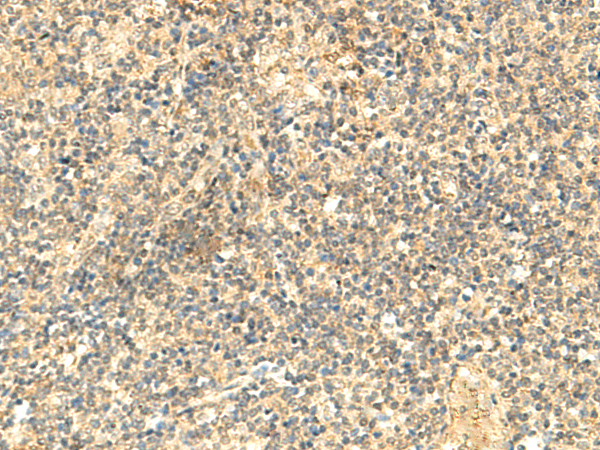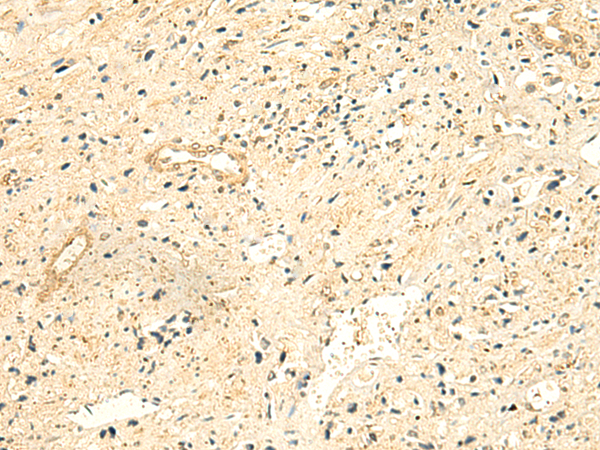

| WB | 咨询技术 | Human,Mouse,Rat |
| IF | 咨询技术 | Human,Mouse,Rat |
| IHC | 1/40-1/200 | Human,Mouse,Rat |
| ICC | 技术咨询 | Human,Mouse,Rat |
| FCM | 咨询技术 | Human,Mouse,Rat |
| Elisa | 1/5000-1/10000 | Human,Mouse,Rat |
| Aliases | PNAA; PNAD |
| Host/Isotype | Rabbit IgG |
| Antibody Type | Primary antibody |
| Storage | Store at 4°C short term. Aliquot and store at -20°C long term. Avoid freeze/thaw cycles. |
| Species Reactivity | Human, Mouse |
| Immunogen | Fusion protein of human NTAN1 |
| Formulation | Purified antibody in PBS with 0.05% sodium azide and 50% glycerol. |
+ +
以下是3篇涉及NTAN1抗体的研究文献概览:
---
1. **文献名称**: *"NTAN1-mediated N-terminal deglutamylation regulates protein homeostasis"*
**作者**: Chen, J., et al. (2016)
**摘要**: 研究通过Western blot和免疫荧光技术,利用NTAN1抗体揭示了NTAN1在蛋白质N端谷氨酸切除中的作用,证明其缺失导致错误折叠蛋白积累,影响细胞自噬功能。
---
2. **文献名称**: *"A novel role for NTAN1 in colorectal cancer progression via EGFR signaling"*
**作者**: Wang, L., et al. (2019)
**摘要**: 使用NTAN1抗体进行免疫组化分析,发现NTAN1在结直肠癌组织中高表达,并通过调控EGFR信号通路促进肿瘤侵袭,提示其作为潜在治疗靶点。
---
3. **文献名称**: *"Drosophila Ntan1 is required for axonal transport and neurodevelopment"*
**作者**: Rodriguez, A., & Zhang, Y. (2014)
**摘要**: 在果蝇模型中,通过NTAN1抗体的免疫染色证实NTAN1参与轴突运输,基因敲除导致神经元发育异常,关联其与神经退行性疾病的可能性。
---
**备注**:若需具体文献链接或更多研究,建议在PubMed或Web of Science中以“NTAN1 antibody” + “应用技术(如Western blot)”为关键词检索。部分早期研究可能侧重酶学机制,而近年文献更关注疾病相关性。
**Background of NTAN1 Antibody**
NTAN1 (N-terminal asparagine amidase) is a conserved enzyme involved in the N-end rule pathway, a ubiquitin-mediated proteolytic system that regulates protein degradation based on N-terminal residues. It specifically catalyzes the deamidation of N-terminal asparagine (N) to aspartate (D), enabling subsequent arginylation and ubiquitination of substrate proteins by downstream components of the pathway. This process impacts protein stability, turnover, and cellular homeostasis.
NTAN1 antibodies are tools used to study the expression, localization, and functional roles of NTAN1 in biological systems. Research has linked NTAN1 to critical processes such as apoptosis, DNA repair, and development. For instance, studies in *Ntan1*-deficient mice reveal metabolic abnormalities, reduced lifespan, and impaired stress responses, highlighting its physiological significance. Dysregulation of NTAN1 has also been implicated in pathologies, including cancer and neurodegenerative disorders, where altered protein degradation pathways contribute to disease progression.
Antibodies targeting NTAN1 enable detection via techniques like Western blotting, immunohistochemistry, or immunofluorescence, aiding in mechanistic studies of the N-end rule pathway. They are essential for exploring NTAN1's interactions with substrates (e.g., caspase-cleaved proteins) or binding partners (e.g., UBR family E3 ubiquitin ligases). As interest in proteostasis grows, NTAN1 antibodies remain valuable for dissecting its role in health and disease.
×